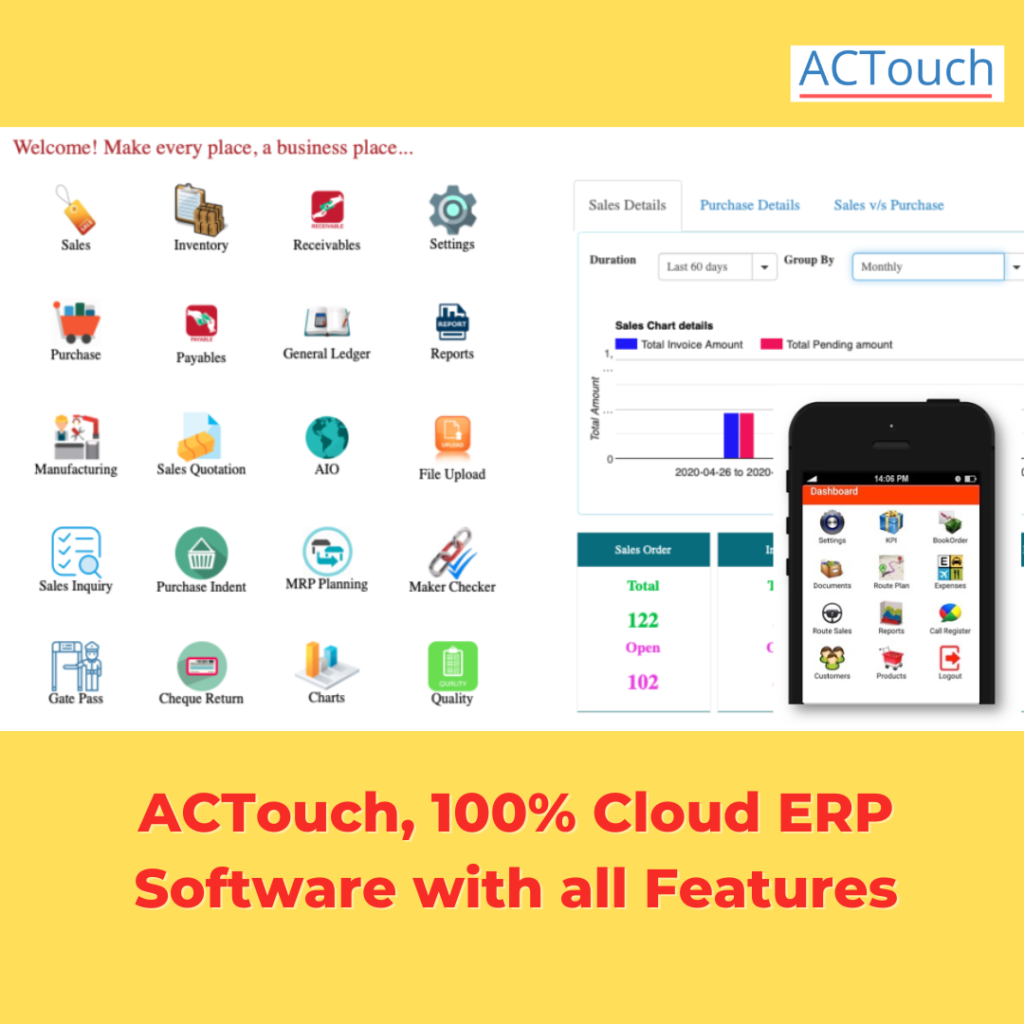What is Cloud ERP Software?
Cloud ERP Software is an Enterprise Resource Planning or ERP software that helps to integrate your business activities like Inventory, Sales, Procurements, Supply Chain etc at one place. These tools helps to integrate your business activities with Finance and helps to establish an auditing process to backtrack, if it’s needed.

What is Cloud ERP Software and how it works?
Cloud ERP software is an ERP software that’s delivered through Cloud Deployment with access over Internet. Any PC or Laptop or Mobile can be used as a medium to access the server and get these data delivered on their device to work. In this case, the software is not installed on company’s server and no one needed to manage it.
ERP Software Vendor hosts these software on their OWN Cloud infrastructure or AWS or MicroSoft Azure or Google Cloud. Typically cost of infra is high depending on whether you use your own infrastructure or any other third party service provider.
Why use Cloud Based ERP Software?
Before we understand this question, let’s understand “What is ERP Software?“. This could help us to understand more about ERP Software, ERP features and ERP benefits.
ERP Software helps us to integrate our business activities across a company or a trading units. It helps us to integrate the business process like Sales and Marketing, Procurement cycle, Manufacturing, Inventory and Finance process. It also adds few more business activities like HR & Payroll, Fixed Assets etc. Traditionally,
Difference between On-premise ERP and Cloud ERP?
The difference between Regular on-premise ERP and Cloud ERP lies in the deployment model, accessibility, cost structure, maintenance responsibilities, and data control. Traditional ERP systems are typically hosted on-premises, have limited accessibility, require upfront investments, and involve maintenance responsibilities for the business. Cloud ERP operates on a cloud-based model, offers enhanced accessibility and mobility, follows a subscription-based cost structure, relieves maintenance responsibilities, and ensures data security through trusted providers. Understanding these differences is essential for businesses to make informed decisions based on their specific requirements, budget, and growth plans.
Deployment Model
Traditional ERP systems are typically deployed on-premises, meaning the software and data are hosted and managed within the company’s own infrastructure. On the other hand, Cloud ERP operates on a cloud-based model, where the software and data are stored and accessed remotely via the internet.
Accessibility and Mobility
With a traditional ERP system, accessing the software and data is limited to the physical location where it is installed. In contrast, Cloud ERP offers enhanced accessibility and mobility as it allows users to access the system from any location with an internet connection. This flexibility is especially advantageous for businesses with multiple locations, remote workers, or those on the go who need real-time access to data.
Cost and Scalability
Traditional ERP systems often require significant upfront investments in hardware, infrastructure, and licenses. Additionally, maintenance and upgrades can incur additional costs. Cloud ERP, on the other hand, follows a subscription-based model, where businesses pay a recurring fee for using the software. This cost structure makes Cloud ERP more affordable for small and medium-sized businesses, as it eliminates the need for upfront investments and provides flexibility to scale resources based on business needs.
Maintenance and Upgrades
In a traditional ERP setup, the responsibility for maintaining the software, applying updates, and ensuring system security lies with the organization’s IT department or an external IT service provider. In contrast, Cloud ERP providers handle these tasks as part of their service. This relieves the burden of software maintenance and upgrades from the business, allowing them to focus on core operations while benefiting from regular updates and improvements provided by the Cloud ERP vendor.
Security and Data Control
Data security is a crucial consideration for any business, and both ERP systems offer different approaches. Traditional ERP systems provide businesses with direct control over their data, as it is stored within their own infrastructure. In Cloud ERP, data is stored on remote servers managed by the Cloud ERP provider. While this may raise concerns about data control, reputable Cloud ERP providers employ robust security measures, data encryption, and backup protocols to ensure the safety and confidentiality of customer data.
The advantages of Cloud based ERP Systems
Cloud-based ERP (Enterprise Resource Planning) systems have gained significant popularity among businesses of all sizes, thanks to their numerous advantages. Here are some key benefits of implementing a cloud-based ERP system:
Enhanced Accessibility
One of the primary advantages of cloud-based ERP systems is the ease of accessibility. With data and software hosted on remote servers and accessible through the internet, authorized users can access the system anytime, anywhere, and from any device with an internet connection. This accessibility enables businesses to have real-time insights and make informed decisions promptly, regardless of their physical location.
Cost Efficiency
Cloud-based ERP systems offer cost advantages over traditional on-premises solutions. They eliminate the need for substantial upfront investments in hardware, infrastructure, and licenses, as well as the associated maintenance and upgrade costs. Instead, cloud ERP operates on a subscription-based model, where businesses pay a recurring fee based on their usage and the features they require. This cost structure makes it more affordable for small and medium-sized businesses, allowing them to allocate their resources effectively.
Scalability and Flexibility
Cloud-based ERP systems provide scalability and flexibility, allowing businesses to adjust their resources as needed. With the cloud’s elasticity, companies can easily scale up or down their computing resources, storage, and user licenses according to their changing business requirements. This agility enables businesses to adapt to growth, seasonal variations, or market fluctuations without significant disruptions or additional infrastructure investments.
Seamless Updates and Maintenance
Cloud ERP providers handle software updates and maintenance tasks, relieving businesses of these responsibilities. The provider ensures that the system is up-to-date with the latest features, security patches, and compliance requirements. These regular updates and maintenance activities are performed in the background, ensuring businesses can focus on their core operations and strategic initiatives without interruption or the need for extensive IT resources.
Data Security and Disaster Recovery
Cloud-based ERP systems employ robust security measures to safeguard business data. Reputable cloud ERP providers invest heavily in data security, including encryption, firewalls, access controls, and regular backups. This level of security provides businesses with peace of mind, knowing that their data is protected from unauthorized access, physical disasters, or hardware failures. In the event of a disaster or data loss, cloud ERP systems offer robust disaster recovery mechanisms, ensuring minimal downtime and data loss.
What are the different types of Cloud ERP Software?
When selecting a cloud ERP software, businesses should consider their industry, size, specific requirements, scalability needs, and budget. Evaluating these factors will help determine the most suitable type of cloud ERP software to streamline operations, improve efficiency, and achieve their business goals.
Each business can have their own needs of an ERP Software that they want to be configurable, easy to maintain and deployable.
Get started with Cloud ERP Now
Cloud-based ERP systems offer several advantages, including enhanced accessibility, cost efficiency, scalability, seamless updates and maintenance, and robust data security. These benefits enable businesses to streamline their operations, improve collaboration, and make data-driven decisions. When considering an ERP system, businesses should assess their specific needs, budget, and growth plans to determine if a cloud-based solution aligns with their requirements. By leveraging the advantages of cloud ERP, businesses can optimize their processes, drive efficiency, and focus on their core competencies to achieve long-term success.
Migrate to 100% Cloud ERP Software Now and enjoy the FREEDOM | ||
 | Talk to us to know more about ACTouch Cloud ERP Software NOW  |